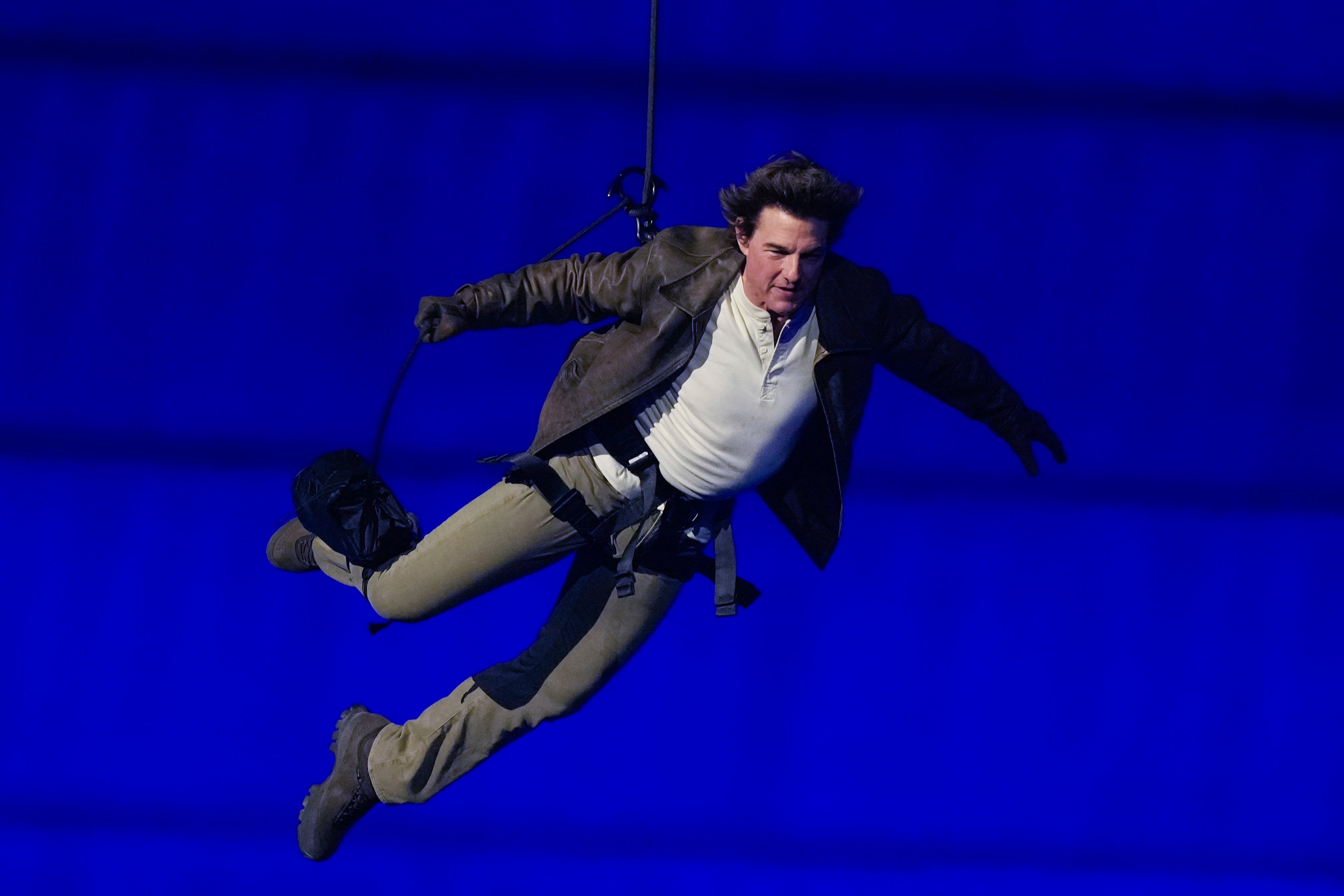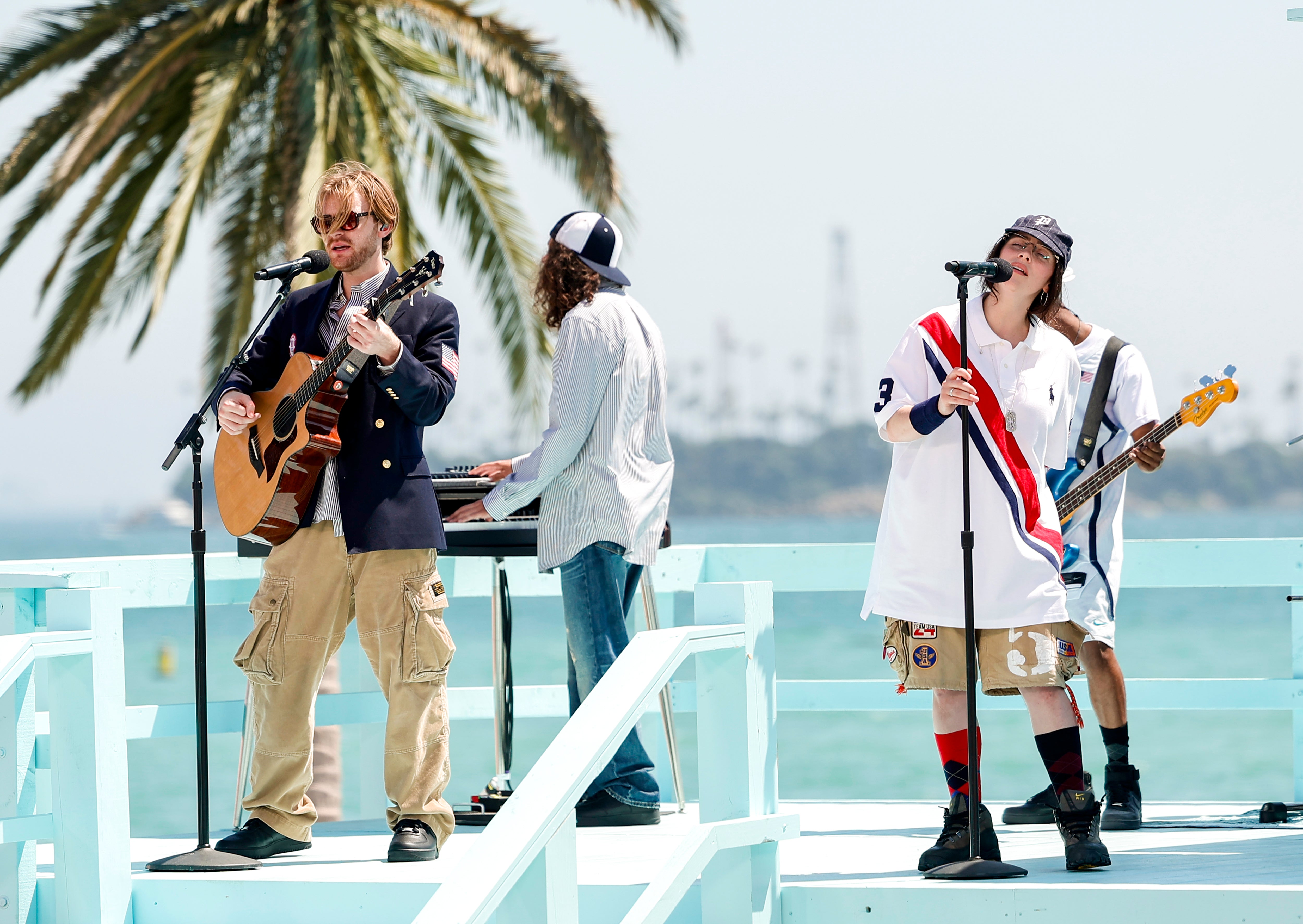“This is not the time for high art,” BBC presenter Hazel Irvine announced, as coverage of the Olympic closing ceremony began. “It’s time for a singsong.” After an opening ceremony marred by the weather (“Damp and extraordinary,” in the words of Irvine’s commentary partner, Andrew Cotter) and subject to a series of confected rows (Donald Trump called it a “disgrace” prompting artistic director Thomas Jolly to revise his script for the closer), this Parisian finale played it far safer. Less high art, more pop concert.
Opening in the Tuileries, where the Olympic flame has spent the past fortnight, French singer Zaho de Sagazan stomped around in Doc Martens, while a choir warbled along with her to “Sous le Ciel de Paris” (”Under the Sky of Paris”). She proved only the first of the many performers on a night when music replaced sport at the centre of attention. French indie rockers Phoenix, inside the Stade de France, were joined by acts from around the world: compatriots Kaminsky and Air, as well as Cambodia rapper VannDa, Belgian singer Angèle, and Vampire Weekend’s Ezra Koenig.
Thomas Jolly’s direction – of both the opening and closing ceremonies – has, at times, resembled the frustrations of French New Wave cinema. Some of the action has been ponderously introspective (a shot of star swimmer Léon Marchand carrying the last flicker of the Olympic flame was pure Truffaut), preferring to remain utterly unrushed. Perhaps, as a consequence, the BBC allotted an extra 25 minutes, after the scheduled end of the event, before the 10 O’clock News began (it still overran). With runtimes of four hours and two-and-a-half hours respectively, Jolly’s ceremonies would have Jacques Rivette checking his watch.

But the dominant mood in the Stade de France was one of relief. A successful Olympics – phew. Jacked up on two weeks of – if the rumours are to be believed – chocolate muffin-fuelled marathon sex sessions, the Olympians paraded out into the Stade de France, bopping along to Joe Dassin’s “Les Champs-Élysées” and Queen’s “We Are the Champions” before the live music began. It set the tone for an evening that had nothing of the artistry of Beijing or the carnival of Rio, but plenty of danceable music.
When the artistic elements finally took centre stage, Jolly took viewers on a journey into, in the words of the BBC’s comms team, “the past, present and future”. A trippy light show proved only a backdrop to the arrival of a dancer in a gold-plumed gimp suit (symbolising, perhaps, the watching public’s relentless horniness for medals). What followed was a maximalist reimagining of the Olympics’ origins. Cotter and Irvine were on hand, as ever, to provide live translation of the rather oblique narrative unfolding on-stage, a pungent mixture of Kabuki, fetish-wear and Tron.
Closing ceremonies don’t carry the same weight of expectation as their opening counterparts. Clare Balding, speaking during the buildup on BBC One, described it as “the fun bit”. All the same, Jolly’s portentous evocation of the importance of the Olympic fraternity didn’t quite hit the same “fun” heights as, say, the women’s breakdancing. For the reported tens of millions of euros it cost to stage the ceremony, couldn’t they have tempted Australian viral sensation Rachel Gunn – aka Raygun – to reprise her performance?
“This is what everyone really comes for: the speeches,” quipped Cotter (who does a good line in snark), as the shambling music festival vibes gave way to the bureaucratic segment. But if you survived that tedium you were rewarded with the handover to 2028 hosts, Los Angeles. Mayor of LA Karen Bass took the flag and began the American invasion (LA ran significantly over the normal 12-minute rule). A wobbly rendition of “The Star-Spangled Banner” was followed by the much-hyped sight of a 62-year-old Tom Cruise (looking increasingly like his Madame Tussauds doppelganger) floating down from the stadium’s rafters. LA native acts Red Hot Chili Peppers, Billie Eilish and Snoop Dogg, played us out, live from a sun-soaked Venice Beach. A stark warning, if it were needed, of what the US is willing to invest in maintaining its soft power hegemony.

This closing ceremony has thrown into stark relief the issues with the games’ curtain-raiser. The Stade de France – an 80,000-seater stadium – proved a sufficiently large canvas for the theatrical elements of proceedings. And unlike the rain-smudged camera shots across the Seine, the joy and excitement was plain to see on individual athlete’s faces. Broadcasters the world over, meanwhile, must have been relieved. The show was rehearsed; the elucidation from the commentary box clearly pre-prepared. The dancers and cameras, within the stadium, moved in perfect sync.
After two weeks of seamlessly delivered sporting action, the high-class pantomime of an Olympic ceremony always feels a bit anticlimactic. But at least Jolly and Co checked the impulse to be avant garde. After all, thousands of people might gather on the streets of Paris, but millions more are watching around the world. This closing ceremony, at the very least, felt like something designed with television audiences in mind.

